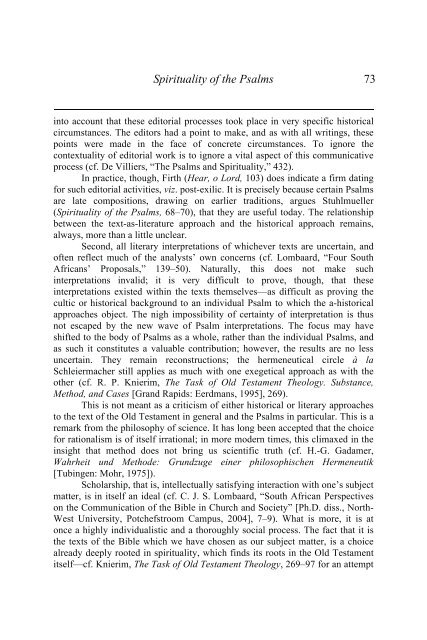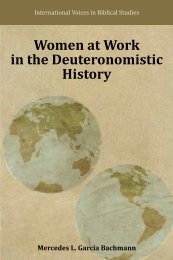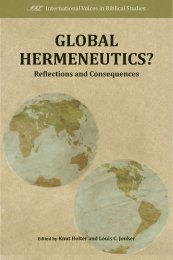The Old Testament and Christian Spirituality - International Voices in ...
The Old Testament and Christian Spirituality - International Voices in ...
The Old Testament and Christian Spirituality - International Voices in ...
Create successful ePaper yourself
Turn your PDF publications into a flip-book with our unique Google optimized e-Paper software.
<strong>Spirituality</strong> of the Psalms 73<br />
<strong>in</strong>to account that these editorial processes took place <strong>in</strong> very specific historical<br />
circumstances. <strong>The</strong> editors had a po<strong>in</strong>t to make, <strong>and</strong> as with all writ<strong>in</strong>gs, these<br />
po<strong>in</strong>ts were made <strong>in</strong> the face of concrete circumstances. To ignore the<br />
contextuality of editorial work is to ignore a vital aspect of this communicative<br />
process (cf. De Villiers, “<strong>The</strong> Psalms <strong>and</strong> <strong>Spirituality</strong>,” 432).<br />
In practice, though, Firth (Hear, o Lord, 103) does <strong>in</strong>dicate a firm dat<strong>in</strong>g<br />
for such editorial activities, viz. post-exilic. It is precisely because certa<strong>in</strong> Psalms<br />
are late compositions, draw<strong>in</strong>g on earlier traditions, argues Stuhlmueller<br />
(<strong>Spirituality</strong> of the Psalms, 68–70), that they are useful today. <strong>The</strong> relationship<br />
between the text-as-literature approach <strong>and</strong> the historical approach rema<strong>in</strong>s,<br />
always, more than a little unclear.<br />
Second, all literary <strong>in</strong>terpretations of whichever texts are uncerta<strong>in</strong>, <strong>and</strong><br />
often reflect much of the analysts’ own concerns (cf. Lombaard, “Four South<br />
Africans’ Proposals,” 139–50). Naturally, this does not make such<br />
<strong>in</strong>terpretations <strong>in</strong>valid; it is very difficult to prove, though, that these<br />
<strong>in</strong>terpretations existed with<strong>in</strong> the texts themselves—as difficult as prov<strong>in</strong>g the<br />
cultic or historical background to an <strong>in</strong>dividual Psalm to which the a-historical<br />
approaches object. <strong>The</strong> nigh impossibility of certa<strong>in</strong>ty of <strong>in</strong>terpretation is thus<br />
not escaped by the new wave of Psalm <strong>in</strong>terpretations. <strong>The</strong> focus may have<br />
shifted to the body of Psalms as a whole, rather than the <strong>in</strong>dividual Psalms, <strong>and</strong><br />
as such it constitutes a valuable contribution; however, the results are no less<br />
uncerta<strong>in</strong>. <strong>The</strong>y rema<strong>in</strong> reconstructions; the hermeneutical circle à la<br />
Schleiermacher still applies as much with one exegetical approach as with the<br />
other (cf. R. P. Knierim, <strong>The</strong> Task of <strong>Old</strong> <strong>Testament</strong> <strong>The</strong>ology. Substance,<br />
Method, <strong>and</strong> Cases [Gr<strong>and</strong> Rapids: Eerdmans, 1995], 269).<br />
This is not meant as a criticism of either historical or literary approaches<br />
to the text of the <strong>Old</strong> <strong>Testament</strong> <strong>in</strong> general <strong>and</strong> the Psalms <strong>in</strong> particular. This is a<br />
remark from the philosophy of science. It has long been accepted that the choice<br />
for rationalism is of itself irrational; <strong>in</strong> more modern times, this climaxed <strong>in</strong> the<br />
<strong>in</strong>sight that method does not br<strong>in</strong>g us scientific truth (cf. H.-G. Gadamer,<br />
Wahrheit und Methode: Grundzuge e<strong>in</strong>er philosophischen Hermeneutik<br />
[Tub<strong>in</strong>gen: Mohr, 1975]).<br />
Scholarship, that is, <strong>in</strong>tellectually satisfy<strong>in</strong>g <strong>in</strong>teraction with one’s subject<br />
matter, is <strong>in</strong> itself an ideal (cf. C. J. S. Lombaard, “South African Perspectives<br />
on the Communication of the Bible <strong>in</strong> Church <strong>and</strong> Society” [Ph.D. diss., North-<br />
West University, Potchefstroom Campus, 2004], 7–9). What is more, it is at<br />
once a highly <strong>in</strong>dividualistic <strong>and</strong> a thoroughly social process. <strong>The</strong> fact that it is<br />
the texts of the Bible which we have chosen as our subject matter, is a choice<br />
already deeply rooted <strong>in</strong> spirituality, which f<strong>in</strong>ds its roots <strong>in</strong> the <strong>Old</strong> <strong>Testament</strong><br />
itself—cf. Knierim, <strong>The</strong> Task of <strong>Old</strong> <strong>Testament</strong> <strong>The</strong>ology, 269–97 for an attempt




